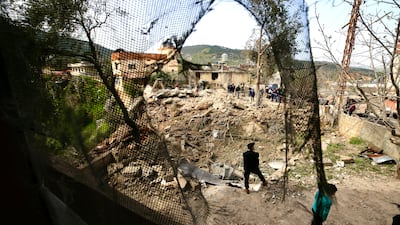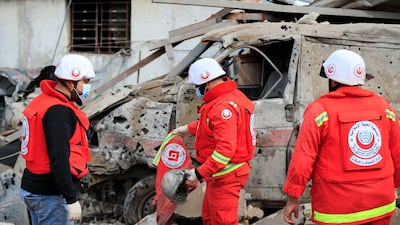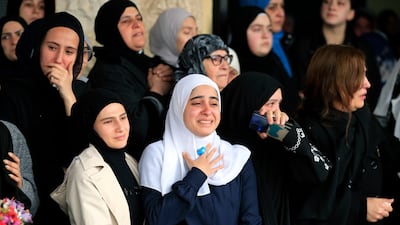Live updates: Follow the latest news on Israel-Gaza
Escalating Israeli strikes on Lebanon have reignited fears of the country being dragged into a full-scale war between Hezbollah and Israel.
“The stakes are now about preventing an all-out war,” a diplomatic source told The National, after Israeli air strikes increased in intensity and scope this week.
Sixteen civilians, including 10 paramedics, were killed in three separate Israeli air raids on south Lebanon on Wednesday, marking the deadliest day for civilians in the country since the cross-border conflict between Hezbollah and Israeli forces erupted nearly six months ago.
On Friday, at least six Hezbollah fighters were among about 40 people killed in Israeli air strikes on Syria’s Aleppo province, while a Hezbollah member, identified as a deputy commander by the Israeli army, was killed in a drone strike on a car in southern Lebanon.
Israeli strikes have also been hitting targets increasingly deep into Lebanon – last week saw strikes in the Baalbek and Hermel areas, more than 100km from the border.
Israeli Defence Minister Yoav Gallant said that the military will “expand the campaign [against Hezbollah] and increase the rate of attacks in the north”.
“Israel is turning from defending to pursuing Hezbollah, we will reach wherever the organisation operates, in Beirut, Damascus and in more distant places,” said Mr Gallant.
Increasingly provocative Israeli strikes have raised fears of major escalation, including concerns from Israel's closest ally, the US.
“Restoring calm along that border remains a top priority for President Biden and for the administration and it has to be of utmost importance, we believe, as well for both Lebanon and Israel,” National Security Council spokesman John Kirby said on Thursday.
“We've also been very, very clear: We do not support a war in Lebanon.”
Despite Israel's escalation, Hezbollah has not changed its stance. The group has repeated that it does not want a full-scale conflict and has so far kept its retaliation against Israeli attacks within constraints.
In a rare on-the-record comment, Hezbollah spokesman Mohamed Afifi told a local news outlet that the party “takes into account Lebanese national interests and the current economic difficulties facing the country”.
“There is a general atmosphere, in the region as a whole and particularly in Lebanon, that does not favour escalation and all-out war,” he said.
Iran-backed Hezbollah opened a “pressure front” to divert Israel from its onslaught on Gaza, a day after Hamas launched its attack on southern Israel on October 7 that sparked the war.
In Lebanon, cross-border exchanges have killed at least 347 people, mostly Hezbollah fighters, but also at least 68 civilians, according to an AFP tally.
Some 20 people have been killed on the Israeli side of the border, around half of them civilians.
'Lebanon for Rafah'
Israel's latest escalation on the Lebanese front is an attempt to pressurise the US into accepting a ground invasion of Rafah in southern Gaza, by waving the threat of a wider war, a source close to Hezbollah and Hamas in the region told The National.
Washington has repeatedly warned Israel against a ground invasion of Rafah, where more than 1.4 million Palestinians have taken refuge. On Tuesday, US Defence Secretary Lloyd Austin met Mr Gallant at the Pentagon amid rising tensions between the two allies.
“One of the goals of the escalation is to gain what can be described as lost time with regard to the military campaign that has been threatened for several weeks against Rafah, and which has not received US approval,” the source said.
“The escalation of the past two days, if it’s met with stronger military responses from the resistance in Lebanon, will strengthen Israel’s negotiating cards with Washington: Lebanon for Rafah, or the opposite.”
Another goal is to “reassure the displaced Israelis from the villages and settlements of the North that Benyamin Netanyahu is serious about addressing their suffering”, the source said.
Israel has stated its intention to push Hezbollah away from the Israel-Lebanon frontier by “diplomacy or force”. The return of 100,000 displaced Israelis to the north of the country is considered impossible for Israel as long as Hezbollah – a much stronger militia than Hamas – remains close to the border and able to strike northern Israel.
Kassem Kassir, a political analyst with insights into Hezbollah, said that the latest attacks might be part of “preparations for a large-scale military operation, to assess the Resistance's capabilities to respond, or to target supply lines”.
“It also confirms the Israeli army's ability to respond to any escalation,” he added.
Meanwhile, the Israeli military launched a major drill in northern Israel on Thursday. The day-long simulation exercise, organised at the highest levels, was based on the eventuality of a surprise war there.
The sudden announcement of the military drill was designed to test the readiness of all branches of the Israeli military, the Israeli army said.
Israel 'luring' Hezbollah
This killing of 10 paramedics “does seem like a big provocation”, said Amal Saad, a lecturer in politics and international relations at Cardiff University.
The escalation could be a “way of luring Hezbollah into a series of missteps that will give Israel strong arguments to convince the US to give the green light to an all-out war,” she told The National.
“Israel is looking for a pretext to say Hezbollah escalated to such a degree that the balance of deterrence has completely shifted and that war was necessary”.
Israel's targeting of civilian elements, not only Hezbollah fighters, seems “deliberate”, she said.
“It's as if Israel is targeting all of Lebanon, not just Hezbollah's fighters or institutions, which places the group in a position where it feels a greater responsibility to retaliate,” she said.
This has put Hezbollah in a difficult position. The militant group is “caught in its own game,” Karim El Mufti, a professor of international relations at Sciences Po Paris, told The National. ”
“We don't know how long Hezbollah can hold in this uncomfortable position: it thought that the rules of engagement would hold, but Israel has completely exposed Hezbollah's reluctance to seriously retaliate,” he said.
On the other side, Israel has completely changed its paradigm to a much more aggressive stance.
“This is something new, linked to the new faces in the right-wing government cabinet”, said Mr El Mufti.
In retaliation for the killing of paramedics, Hezbollah fired rockets with heavy warheads at towns in northern Israel on Thursday, saying it used the weapons against civilian targets for the first time. One man was killed when a building was hit.
“It's still below the threshold of the type of escalation required to provoke a war. But I don't see Hezbollah going way beyond that; I don't see them going beyond the red lines,” Ms Saad said.

Diplomatic efforts
Western diplomatic efforts have recently intensified with the aim of preventing the Gaza war from spilling over into a full war in Lebanon.
Mr Kirby said the US is working to halt the fighting through diplomatic efforts, stressing that this needs to be a top priority for Israel and Lebanon.
In February, France submitted its de-escalation plan aimed at laying the groundwork for restoring safety along the Lebanon-Israel border after the end of the Israel-Gaza war.
These are two distinct initiatives.
“The French initiative is different from the American one in that it has laid out the basics of de-escalation in the south, while the Americans are focusing their efforts on Gaza,” said the diplomatic source.
Lebanon recently provided its feedback on the French blueprint. “The Lebanese government's response is quite positive. There are a couple of points to discuss, but they have understood that it's not an Israeli document,” the diplomatic source added.
“This is not at a negotiation stage but preparing the ground for the day after the war: this strategy avoids leaving things vacant, which generally fosters extremism.”
Despite diplomatic progress, all eyes are focused on Gaza, as Hezbollah has repeatedly said it would not accept a ceasefire on the border without a ceasefire in the Palestinian territory.
“The Lebanese government responded to the French proposal, but the party prefers to postpone any discussion until there is a ceasefire in Gaza,” Mr Kassem said.
In the current situation, with ceasefire negotiations at a standstill, “escalation and wide-scale war cannot be avoided unless the war in Gaza stops or a comprehensive agreement is reached”, he warned.











